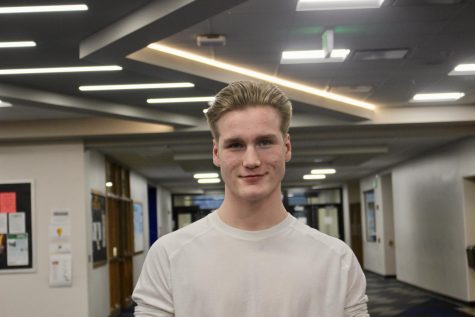“The Artist” and “The Jock” speak out against stereotypes
Inspired by staff writer, Lyn Jarrell’s own experiences, upcoming junior Elora Cline and graduating senior Tyler Lehner talk about why high school stereotypes are harmful.
Sophomore Lyn Jarrell is a staff writer for Elkhart Memorial GENESIS who specializes in opinion and column writing.
May 23, 2020
Oh, stereotypes. We just “love” them, don’t we? No. Absolutely not. Stereotypes are not things that I like to be associated with, and I definitely don’t like when people judge me before they even talk to me or get to know me.
My appearance doesn’t mean that I fit a certain stereotype, and I definitely may surprise you by how caring I truly am. Yes, there are a lot of people who do fit into certain stereotypical classifications, but that doesn’t mean everyone does, or that there isn’t more to a person.
For instance, I dress in band tees and merch, ripped jeans, and I rock a faux leather jacket. I love rock, punk rock, dark rap, and heavy metal music, and because of that, people tend to believe that I am “goth” or “punk”. The biggest assumption that people have of me, is that I am a “devil worshiper”. What even?
I sport a “RBF” and I may always appear to be “uninterested”, but that doesn’t mean I am uninterested. In fact, that’s just how my face is. People assume that I am mean because I never really smile much, I never really talk much, and they assume by my appearance that I don’t care about anything and that I have failing grades. But I can assure you, I do, in fact, care about people and things. And I DON’T fail.
I have good grades, and I am not always mean. I’ve been told that I have this aura of bad attitude. That there is just this aura around me that produces a “hardcore trouble maker” vibe because of how I appear to be, and that I seem “unapproachable”.
I am not the only person that is affected by assumptions, pre-judgments, and stereotypes. There are well-known lists that consist of the most common stereotypes that high schoolers are affected by:
The top two, go like this:
The Artist–
The artist stereotype is classified by one’s general ability to produce art. Whether the art be special effects, drawings, paintings, or some other creative form.
Upcoming junior Elora Cline says that she has been negatively affected by this stereotype.

G: Have you ever been stereotyped as an “artist”? If yes, why do you think you were?
EC: Yes, people assume I’m anti-social and weird. I believe it’s because a stereotype for art kids is that they are antisocial and awkward.
G: Do you think you were stereotyped based on your appearance? On your personality? Maybe your performance?
EC: Definitely my appearance because if they got to know me or talked to me, I’m pretty outgoing, but I might look shy.
G: How has being stereotyped as an “artist” affected you?
EC: It has caused me to not make as many friends in other groups, like athletics.
G: Artists are typically portrayed to be “antisocial and weird”, do you believe that you fit that description?
EC: Not really, I’m actually pretty good at talking to people. I used to be very awkward, but now I can introduce myself to people and stuff like that.
G: How does being categorized by others, based only on your appearance, make you feel?
EC: Pretty upset because I really love talking to people, and since I fit in the stereotype, I never get to meet anyone new, especially when I’m around those classes.
G: Is there more to you, than just your artistic abilities?
EC: Yes. I think people can fit into multiple stereotypes and I feel like I can do more than just art and making stuff.
G: What do you wish people understood about you?
EC: That I might look shy and possibly may come off as pretentious, but I actually really like people and I want to make friends, rather than be alone.
G: What would you say to people who stereotype you, and to people who make assumptions about you, without getting to know you?
EC: That I’m more than I look and I really want to get to know people and talk.
G: What should people do instead of stereotyping each other?
EC: People should actually get to know a person, instead of just assuming that they are like other people in that same “group”.
G: What would you say to others who are struggling with being stereotyped?
EC: They should go against stereotypes and do what they want. You can be an art kid and a sports kid, and much more than what your stereotype is.
The Jock–
The jock stereotype is classified by one’s contribution in athletics. They always seem to know everyone and they are mean. They’re typically represented as “airheads”.
Senior Tyler Lehner says that he has been negatively impacted by this stereotype. 
G: Have you ever been stereotyped as a “jock”? If yes, why do you think you were?
TL: Yes, I have been stereotyped as a Jock. I think I got this stereotype because of my involvement in football and unified track, and all the patches on my letterman jacket usually gives people the assumption that I’m a jock.
G: Do you think you were stereotyped based on your appearance? On your personality? Maybe your performance?
T: I think I was stereotyped based on my performance and my appearance. I hope I don’t sound like I’m tooting my own horn, but a lot of people know me at school as being the Quarterback on the football team.
G: How has being stereotyped as a “jock” affected you?
TL: Being stereotyped as a jock has given people the assumption that I’m a jerk like a lot of the other jocks. This itself brings a negative impact on me because I am a people pleaser, and I love to see everyone happy. To me, everyone deserves to be loved and appreciated, and a lot of jocks are cocky and arrogant and don’t feel the same way I do.
G: Jocks are typically portrayed to be “all looks but no brain”, do you believe that you fit that description?
TL: When it comes to “all looks but no brain” I don’t think I fit that description. I am proud to have maintained a 3.5 GPA, and I don’t consider myself to be the best looking guy in the room.
G: How does being categorized by others, based only on your appearance, make you feel?
TL: When people I haven’t met see me, and assume that I’m a cocky jock, it just makes me eager to strike up a conversation so that the person can see that I have feelings, emotions, and I’m not a mean person.
G: Is there more to you, than just athletics?
TL: There is absolutely more to me than just athletics. I love school, I love my classmates, my teachers, and of course, I love my city. I’m not a selfish person, and I always try to put others before myself. I would agree that I shouldn’t be stereotyped off of assumption, and I hope that anyone that sees me and thinks “oh he’s a jock” would just come and talk to me and see who I truly am.
G: What do you wish people understood about you?
TL: I wish people would understand that I have love and respect for everybody. I don’t care what you look like, what race you are, or even what your sexuality is, if you need a person to rely on, I’m that person.
G: What would you say to people who stereotype you, and to people who make assumptions about you, without getting to know you?
TL: To the people making the assumptions, I would just tell them to hop out of their comfort zone and come have a conversation with me, I love making new friends!
G: What should people do instead of stereotyping each other?
TL: Stereotyping is something that will never go away. I wish it would, but it probably won’t. Instead of stereotyping, I wish people would just learn how to be open to other people and get over the nervousness of meeting new people.
G: Do you have any negative impacts from being judged?
TL: The only negative impacts I can think of from being judged as a jock is that people only see the bad you do, if you do a single thing out of line, everyone looks at you differently. Nobody ever sees the good in people and it’s a shame.
G: What would you say to others who are struggling with being stereotyped?
TL: To those struggling with stereotyping I would say to just keep being yourself! Not everyone is going to love you for who you are, and that’s okay, but never lose your roots and always stay true to yourself.
I’m sure by now, we’ve all thought of people that we know, that would fall into each stereotype. Despite that, I’d like for the stereotype outlook on people to disappear.
Stereotypes can interfere with one’s own ability to perform daily tasks. They can cause expectations, and they can prevent others from reaching out and approaching others.
Not only that, but stereotypes and pre-judgments can always hurt a potential friendship, and it reduces the chance of making friends in general. Rather than classifying people, why not just accept them for who they are, as an individual? It isn’t that hard, really.
The views in this column do not necessarily reflect the views of the GENESIS staff. Email Lyn Jarrell at [email protected].








